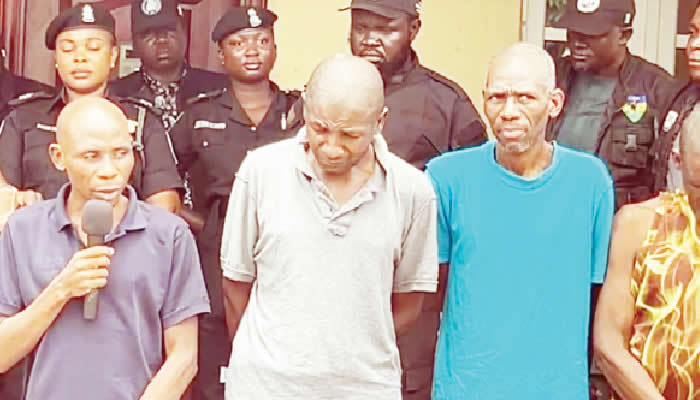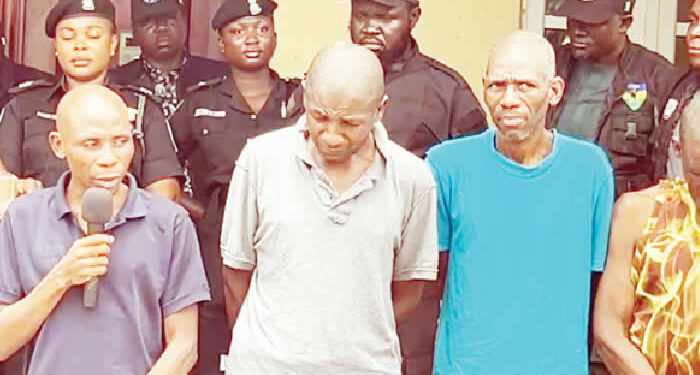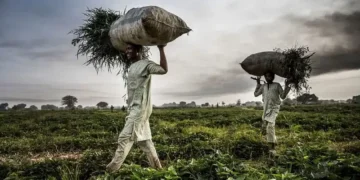On September 19, 2024, Taimako Mato, a 38-year-old man from the Tafawa Balewa Local Government Area of Bauchi State, found himself at the center of a troubling narrative as he was paraded before the media at the Nigeria Police Force headquarters in Abuja. Arrested alongside four accomplices, Mato shared his harrowing story that reveals the complex motivations behind his involvement in a gun-running syndicate that supplied arms and ammunition to terrorist groups.
Mato’s troubling journey began in 2024 when his community faced a violent attack from Boko Haram militants shortly after the general elections. The assault, however, was met with a swift response from local youths and security operatives, who managed to repel the attackers. In the chaos that ensued, the militants abandoned their vehicles, leaving behind a cache of weapons. This pivotal moment would forever alter Mato’s life.
In his own words, Mato recounted, “My name is Taimako Mato. I am from Tafawa Balewa Local Government Area of Bauchi State. I got this gun after some Boko Haram members attacked my community two days after the 2024 elections. The youths and security agents chased them away, and they left their vehicle behind.” With urgency in his voice, he added, “The youths decided to burn their vehicle, so I searched the vehicle before it was set ablaze and took a bag containing the gun and some ammunition. I picked it up because it was what I could grab before the vehicle was burnt.”
The initial acquisition of the firearm, driven by desperation and the desire for self-protection, soon spiraled into a darker path. When questioned about his decision to sell the ammunition, Mato revealed that familial challenges played a significant role in his choices. “I decided to sell the gun because of family challenges. I know that it is criminal to possess prohibited firearms, but I did not intend to be a criminal,” he admitted, reflecting on the difficult circumstances that led him to make such a perilous decision.
Mato’s regret was palpable as he expressed a heartfelt plea to others who might be contemplating a similar path. “I am advising those who have not gone into this business and those who are into it to stop because the business appears lucrative from the outside, but once you start, you will realize it is not,” he cautioned. He urged potential criminals to reconsider, stating, “You will just be suffering in it and be punished by the law. My advice for criminals is to come and surrender their weapons.”
The Nigeria Police Force, represented by Force Public Relations Officer Olumiuyiwa Adejobi, provided further context to Mato’s arrest. He revealed that Mato was the head of a syndicate specializing in procuring weapons and distributing them to criminal elements within the region. “In recent developments, operatives of the Nigeria Police Force have made significant strides in combating various forms of violent crime, including dismantling a gun-running syndicate operating in the Bauchi-Plateau region,” Adejobi stated. The operation led to the arrest of Mato and four other suspects, during which law enforcement seized a PKT machine gun, various rounds of ammunition, and other prohibited firearms.
According to Adejobi, Mato had previously served as a weapons handling instructor at a Boko Haram camp, showcasing the depth of his involvement in the illicit arms trade. “He procured these prohibited weapons and passed them on to other members of the syndicate for sale to various buyers,” Adejobi explained, highlighting the systemic nature of the gun-running operation.
As Mato’s story unfolds, it sheds light on the broader issues of insecurity, desperation, and the allure of criminality in regions plagued by violence. It serves as a poignant reminder of the choices individuals make in the face of adversity and the dire consequences that often follow.
With this narrative, we witness a man grappling with regret, urging others to avoid the path he took—a path marked by crime, danger, and inevitable punishment. The tale of Taimako Mato encapsulates the ongoing struggle against arms proliferation and the urgent need for community resilience in the face of such challenges.









